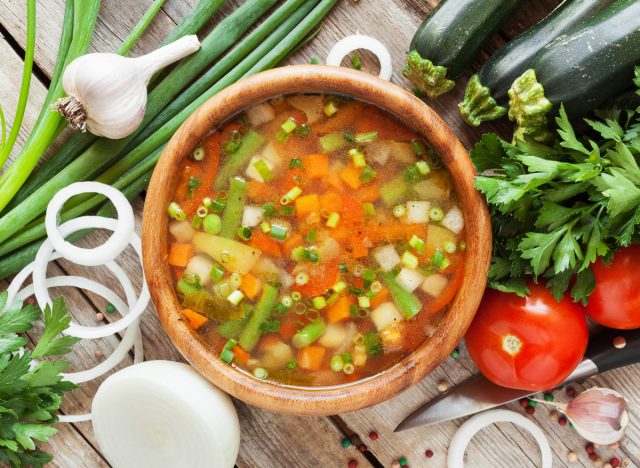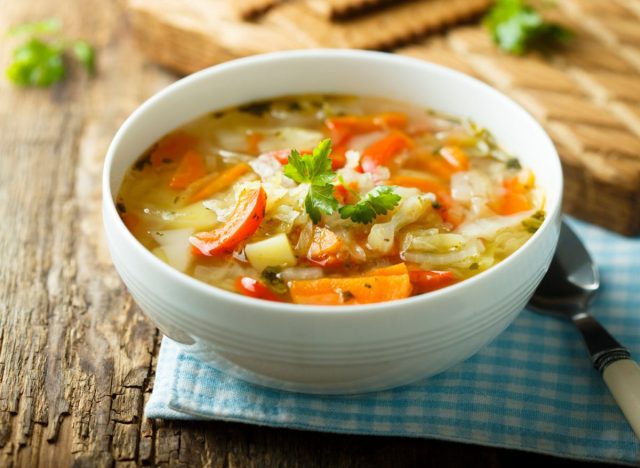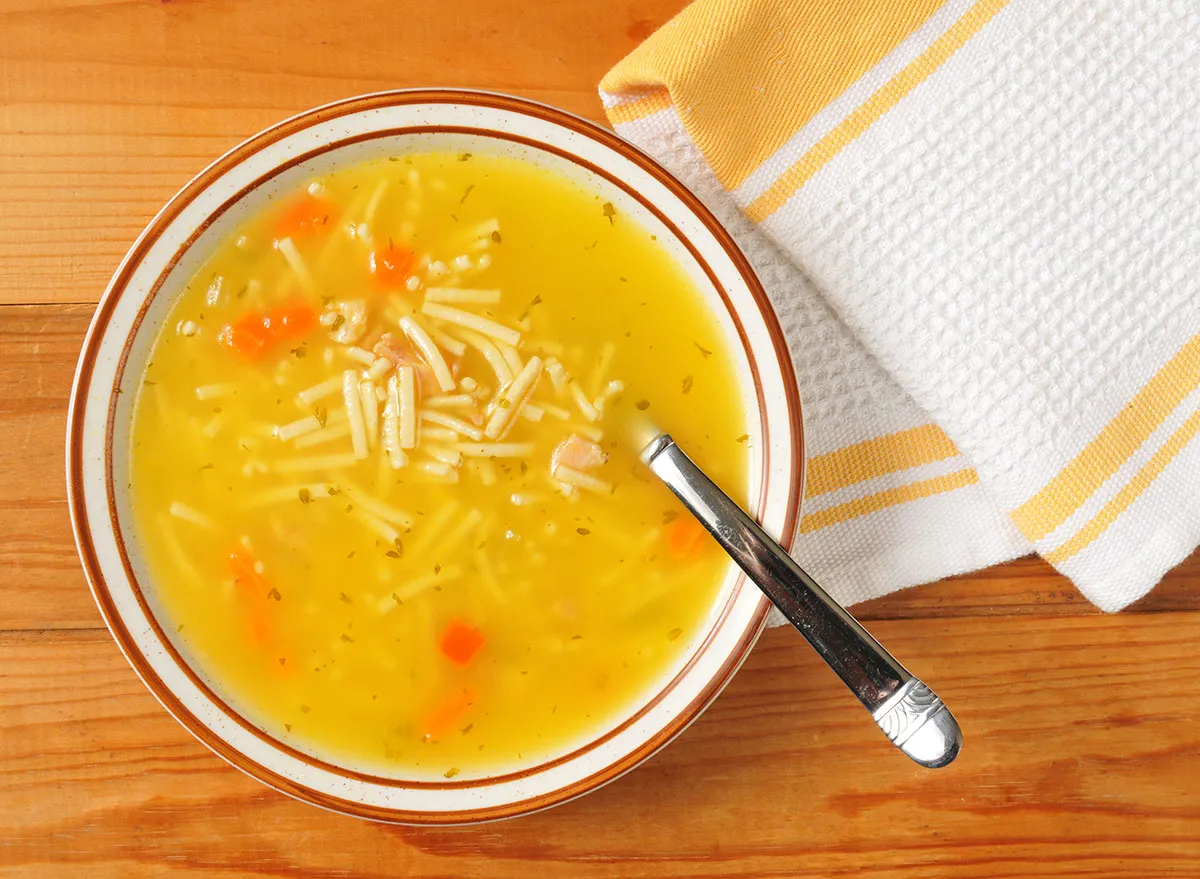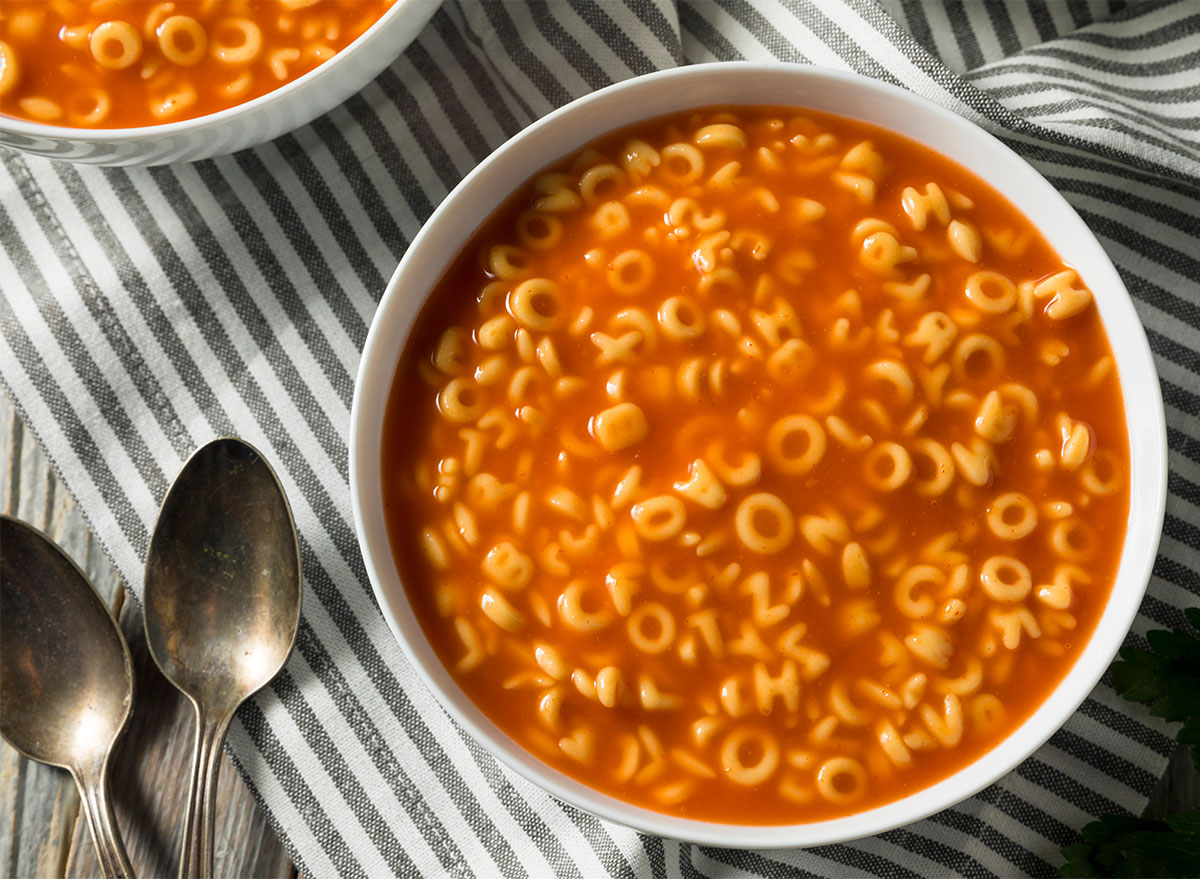There may be nothing more satisfying and cozy than a hot bowl of soup, especially on a cold fall or winter day, or when you're feeling under the weather. Whether it's a thick and creamy bisque or a broth-based chicken noodle, soup can always provide some comfort when you need it most. But those who regularly consume this food may wonder if soup is healthy, or if comes with some potential side effects too.
For all the soup lovers out there, we wanted to find out just how healthy, or unhealthy, this warming food can be if you eat it every day. Of course, every soup is different depending on its ingredients and whether it's store-bought, from a restaurant, or homemade. Choosing homemade soups is more often than not going to give you the best nutritional bang for your buck, as many soups from restaurants or the grocery store come loaded with sodium and saturated fats. But this article takes a look at soup from a broader perspective and discusses some benefits and side effects they share in general.
We talked with dietitians and looked at recent research studies to get clear on what happens when you consume soup regularly.
Your gut health may improve.

If you make a soup that is packed full of vegetables, you'll be giving your gut a health boost.
"Veggie-packed soup is great for your gut in more ways than one," says Maggie Michalczyk, RDN. "It adds more fiber to the diet, which is great for digestion and satiety, and many vegetables commonly found in soups like leeks and onions contain prebiotic fiber that can help feed the good bacteria in the gut."
Along with adding fiber, getting a variety of vegetables in your soup can "help diversify the good bacteria in the gut, which studies have shown helps keep it healthy and in tip-top shape," says Michalczyk.
You can get a boost of protein.

A bowl of soup is as nutritious as you make it, and many soup recipes are great opportunities to throw in some important nutrients like protein. Soups like chicken noodle, slow cooker beef stew, ramen, curry, chicken fajita, or pork and beans are all examples of soups that come packed with protein.
"Soup can be a significant source of protein, especially if it's made with bone broth instead of the salty water that you often get in canned soup," says Elizabeth Ward, MS, RDN, co-author of The Menopause Diet Plan, A Natural Guide to Hormones, Health, and Happiness. "Adding edamame, tofu cubes, or chicken increases the protein content. "
Lisa Young, PhD, RDN adds that incorporating "lean protein sources like chicken, fish, or tofu can enhance satiety as well."
Getting enough protein at every meal can be a challenge, especially if you're tired of making the same old dishes every night. With soup, you can make a big batch ahead of time and have high-protein lunches or dinners for the rest of the week, which will help you feel more satiated and energized.
Certain soups may have medicinal qualities.

Have you ever wondered whether or not chicken noodle soup can actually help you feel better when you're sick, or if it's nothing more than a soothing meal? Although it is comforting for under-the-weather days, some research supports this soup having anti-inflammatory effects as well.
A researcher from the University of Nebraska Medical Center found that classic chicken soup contains numerous benefits related to the vegetables and chicken inside and that together it carries "medicinal activity." The researcher concluded that the link to helping heal upper respiratory illnesses (like colds) most likely comes from this soup's mild anti-inflammatory effects.
So next time you're sick, don't hesitate to pour yourself a hot bowl of chicken noodle soup!
You'll likely consume a serving of antioxidant-rich veggies.

There are plenty of soup options out there for you to enjoy, but research suggests that vegetable soup is the healthiest kind you can eat. A report published in the journal Plants says that vegetable soups are full of minerals, vitamins, and bioactive plant compounds that contribute to their health benefits. They also found that along with providing a ton of nutrients to the body, these soups also promote hydration and satiety.
An earlier study also found that participants who consumed a vegetable soup daily (specifically gazpacho) were able to increase their intake of vitamin C and antioxidants, which was linked to anti-inflammatory effects and less oxidative stress.
Young adds when making vegetable soup, "Combining various vegetables and legumes increases your intake of fiber and essential nutrients, supporting overall health."
You might feel full more quickly.

Depending on the type of soup you're eating, having a bowl or cup before your main course may help you feel more satisfied. In fact, researchers have found that soup can cause greater fullness than a solid meal.
According to Laura Burak MS, RD, CDN, foods with a higher water content can fill you up faster. "Beginning a meal with a soup or salad, both high-water volume, low-calorie foods, will fill you up and prevent overeating at meals," she says.
This could mean that if you're someone who enjoys a nice side of soup with your dinner, you may find yourself consuming fewer calories altogether, while still feeling fully satisfied.
You can get more nutrients for fewer calories.

The great news is that if you are intentional about what you put in your soup, you can ensure that you're getting tons of nutrients for fewer calories than most other meals. Studies have even shown that soup is a contributing factor in losing weight, maintaining weight goals, and lowering the risk of obesity.
Toby Amidor, MS, RD, CDN, FAND believes soup has the potential to be a great source of nutrition.
"If it is a broth-based soup that has lots of vegetables and beans, it's a fabulous way to take in fiber, antioxidant vitamins A and C, and potassium," she says.
Burak agrees. "Broth-based soups are a great bang for your nutritional buck," she says. When we skip the creamy soups and stick with a broth that contains foods like veggies, beans, or lentils, "we fill our tank with tons of nutrients and fiber, but without a lot of calories."
Lauren Hoover, RD adds that even the way we prepare soup can help us get our nutrients with fewer calories throughout the week.
"Soups are easy to prepare, especially if using a slow cooker or pressure cooker, and can be made in large batches," says Hoover. "Prepping a big, nutrient-rich soup on the weekends is a great way to ensure you've got a healthy, nutrient-rich lunch for the week."
On the other hand, your hunger may not always be satisfied.

With that being said, it's important to note that sometimes, eating certain types of soup as a main course can actually leave you feeling hungrier later. This has everything to do with what ingredients you choose and how many nutrients you're consuming in the meal as a whole. If you're eating soup on its own without anything else on the side, it's important to make sure the soup itself is nutrient-dense.
Hoover believes that eating soup with a variety of balanced nutrients is the key to feeling full and satisfied.
"Some soups aren't very filling if they are missing a main macronutrient (e.g. protein, complex carb, etc.)," she says. "So, [as a] result, having soup for a meal can lead to under-fueling and excessive snacking later on."
Burak also suggests packing your soups full of nutrient-dense foods to avoid feeling hungry and overeating.
"Stick with lower sodium broth-based soups that contain nutritious ingredients like veggies, herbs, spices, and high-fiber grains, beans, split peas, and lentils," Burak says.
You may consume a lot of saturated fat.

There's nothing quite like a bowl of oh-so-cheesy broccoli cheddar soup or a creamy clam chowder. Unfortunately, this type of soup can pack a punch when it comes to calories and saturated fat. Our dietitians all agreed that when choosing your soup, it's important to know that any cream-based soup is going to be much higher in fat content.
Burak suggests consuming broth-based soups instead of cream-based if you want to lower your fat consumption.
"Soups made with heavy cream instead of broth can be calorie bombs, and they tend to contain a high amount of saturated fat (not the heart-healthy kind)," she says.
Amidor agrees that the butter and other high-fat ingredients in cream-based soups can lead to an increase in the consumption of saturated fat. She also reminds us that this increase in saturated fat consumption "has been shown to increase your risk of cardiovascular disease—especially if you're eating it often."
You may consume a lot of sodium.

Along with a high saturated fat content, soup can come with an overload of sodium, as well. The American Heart Association recommends the average person consume no more than 2,300 milligrams of sodium per day, but an ordinary can of Campbell's Chicken Noodle Soup already has 890 milligrams of sodium per serving.
"Although soups can be a healthy choice, they tend to contain high levels of sodium, especially when you buy them from a restaurant instead of making them yourself," Burak explains. To combat these higher levels, she suggests "making homemade batches of easy soups so you can control the sodium." And if you're craving some restaurant-made soup for the evening, "just flush it down with lots of water, especially if you're salt-sensitive," Burak says.
Whether you're craving the creaminess of a bisque or chowder, or reaching for the broth-based chicken noodle, our dietitians all agree that making soup at home instead of ordering it at a restaurant or going for the canned version is always the better option for your health.
Hoover suggests choosing "a lean protein source, a complex carbohydrate, veggies, and a broth base" for the perfect at-home healthy soup. And Amidor adds that if you are going to go for the creamier soup base, try using some "starchy vegetables such as Yukon Gold potato or butternut squash." When aiming for the perfect healthy, home-cooked soup, "don't forget to garnish your soup with a few tablespoons of chopped nuts, pumpkin seeds, salsa, or Greek yogurt," says Amidor.
No comments:
Post a Comment